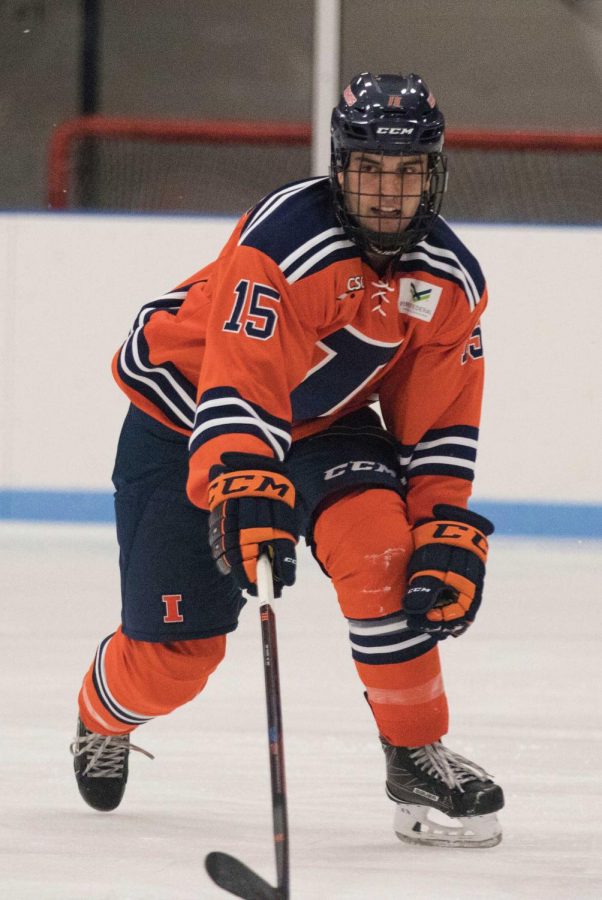New 3-on-3 overtime brings mixed reactions from Illinois hockey
Eric Cruickshank (15) reaches for the puck to gain possession from Michigan State at the Ice Arena on Friday, Sept. 22. Illini beat MSU 4-1.
Oct 23, 2017
The American Collegiate Hockey Association announced this summer that 3-on-3 hockey was going to take over overtime play. This news got mixed reactions from the players and coaches of the Illinois hockey team.
Illinois coach Nick Fabbrini was one of the opponents of the rule change and let his disapproval known.
“I was disappointed,” Fabbrini said. “We voted on it down at the coaches meeting and I personally voted against it just because the way the rankings are, an (overtime) loss is the same as a regulation loss, so 3-on-3 hockey is going to determine rankings in certain senses here and I don’t think that’s right necessarily.”
Fabbrini went on to say that if you win the opening faceoff at the Illinois Ice Arena, during a lengthy line change, you can theoretically have the puck for two to three minutes in one zone which obviously gives that team an enormous advantage in a golden-goal situation like overtime hockey.
However, senior forward Eric Cruickshank was more open to the idea of 3-on-3.
Get The Daily Illini in your inbox!
“I think it’s cool because we’ve never been able to obviously do it,” Cruickshank said. “It’ll be fun, it will be nerve-wracking the first couple of times and we’ve never done it, but it will add a little bit more scoring and hopefully more excitement.”
What Fabbrini and Cruickshank both agreed on is that this Illini team is built well to play in overtime conditions.
Fabbrini feels that the amount of preparation his club has on its home ice, such as 2-on-2 and 1-on-1 drills, will benefit his team well in overtime action this year, while Cruickshank said the speed and skating ability himself and teammates possess will translate well to that style of play.
From the viewpoint of a goaltender, senior David Heflin said he does not believe the game changes much in the new overtime setting, but it allows him to be more aggressive offensively for his team.
“I really enjoy playing the puck, getting out there and maybe setting up a couple passes for odd man rushes, I’m kind of excited for that,” Heflin said. “If I can play the puck and help my teammates get a little offense going, then I’m going to get in on the play and do that.”
Communication still comes first for Heflin in 3-on-3 hockey. He noted that everyone is running very high on adrenaline at that point and everyone is focused on what they want to do, and he thinks it will come to benefit the Illini in overtime situations down the road.
Cruickshank said the offensive perspective of players will change once overtime becomes a reality for Illinois this season.
“There’s a couple of things you have to avoid such as taking shots high and having the puck wrap around the boards for breakout passes,” Cruickshank said. “Offensively, it’s nice, you have a lot more room to work with and it’s more of a possession game for sure. Once it gets in that 3-on-3, you got to have the puck and if you don’t, then you know you got to get it back.”
Defensively, Cruickshank said that the Illini need to treat overtime as if they are on the penalty kill. Conservative defensive play is needed and players cannot overpursue things as that can lead to disadvantages in their own zone.
The biggest key to overtime hockey is limiting the number of turnovers, said Fabbrini.
“A lot of the way we play is based on trust and be able to trust the puck carrier to make a good decision,” said Fabbrini. “It’s really about being conscious and responsible with puck.”






